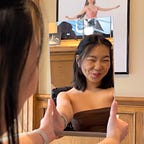Outline: the perfect lockdown book
“Outline, so aptly named, is a sketchbook of lives, charcoal drawings of souls captured in profile.”
Outline by Rachel Cusk. Oh.
When I was a lot smaller, Mom told me about people she knew and still kept in touch with. I’d listen quietly but very inquisitively as in my mind, I sketched pictures of strangers I’ve never met. Other times, she casually mentioned conversations she observed with other parents, when driving my little sister and me to after-school programs. She used a strange but very simple word — “intelligent” to describe some of our mutual acquaintances, parents she had lengthy conversations with, who I got to know by their lavish praises and supportive comments. Being good friends with their kids, I saw bits of their parents brush off from them, parts that I could catch.
“Intelligent” was a soft word with sharp edges. This word was gentle and soft because it always came from a place of kindness, but sharp because it drew vertical lines dividing people into groups, in which most people we knew had an untraceable membership. “Intelligence” meant something more than the usual sense of the word. This quality comes from seeing what is silent in a room while the conversation does not chip or falter, and reading the pace and fluidness of the people’s gestures, the expressions people wore, and the almost inaudibly subtle cues each person revealed, and the precise needs each person attempts to fulfill and satisfy. It’s like when some parent tries to have a conversation with me, I learned to not intentionally turn my head to look at the clock hanging on the wall, or glance down as quickly as I could towards the pink digital watch on my left wrist. I knew that although I thought I was agile and swift, people saw these motions.
Rachel Cusk’s speaker in Outline comes across many mildly interesting individuals, who gradually become insatiably interesting to me as they present themselves and spin the spool of conversation. The speaker, a writer visiting Greece from England to teach at the height of the summer, has such intricate observations that are exceedingly meditative and revealing of people’s characters. That is to say — we cannot deny it — that our speaker is a judgemental person picking flaws out of the smooth curves of lifelike marble statues, and every stranger comes off to her with a twinge of her disapproval. Her attitudes reveal to us that she is not morally pristine or without burden herself, and her own words are flanked with a queasy strangeness.
This anti-description, for want of a better way of putting it, had made something clear to her by a reverse kind of exposition: while he talked she began to see herself as a shape, an outline, with all the detail filled in around it while the shape itself remained blank. Yet this shape, even while its content remained unknown, gave her for the first time since the incident a sense of who she now was. (Cusk)
As the world is on halt, we readers are temporarily staying put and we cannot pick our bags up, catch the next flight out of town, and travel with spontenaeity, and who knows when we will be able to go solo backpacking in Europe, or learn a stranger’s life story over a conversation on a stuffy flight. The book Outline fit a cleanly cut gap that I didn’t even know existed somewhere inside of me, clicking into place perfectly. I loved reading it.
Borrowing Julie’s words from goodreads, “Outline, so aptly named, is a sketchbook of lives, charcoal drawings of souls captured in profile.”
